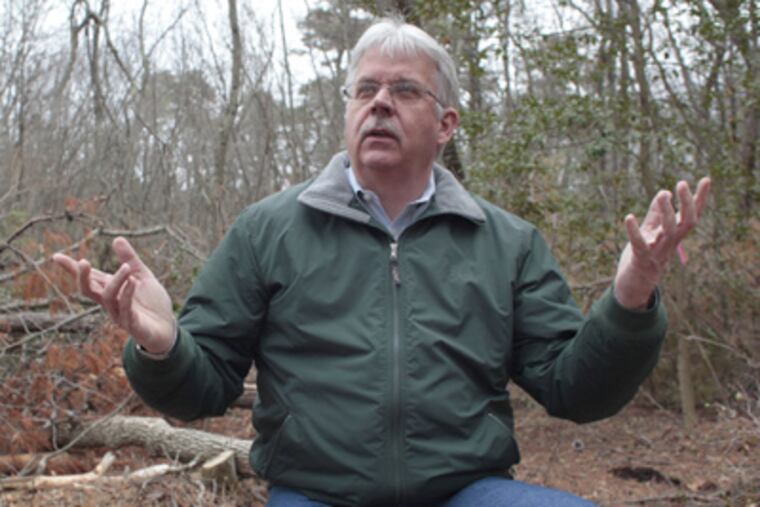Kevin Riordan: Deptford man's film aims to clear forests of misconceptions
Professional forester Bob Williams knows quite a bit about growing trees. But making movies? Not so much - until he produced A Working Forest with the help of a family-run film and video company in Atlantic County and a friend who plays with the Rolling Stones.

Professional forester Bob Williams knows quite a bit about growing trees.
But making movies? Not so much - until he produced A Working Forest with the help of a family-run film and video company in Atlantic County and a friend who plays with the Rolling Stones.
About that, more in a moment. Let's just say rock as well as roots are involved in this new DVD (http://aworkingforest.com), which makes a case for utilizing, as well as protecting, the woods.
"I got the idea that a documentary would be a powerful tool for the forestry community," says Williams, a vice president at Land Dimensions Engineering in Glassboro.
"I've seen a lot of videos that seem stiff and predetermined," he says. "My interviews were unscripted. . . . I would just ask, 'How do you feel about your land?' It was very powerful."
An affable, strikingly tall (6-foot-6) Deptford resident who grew up in Glendora, Williams holds a forestry degree from Rutgers University and has worked in his field since 1975.
He says he believes the public generally doesn't understand the complexity of forestry, reducing questions of how best to manage our woodlands into arguments about whether or not to cut particular trees.
Nuances about commercial lumbering, land development, and private stewardship - in particular, management techniques such as controlled burning - get lost amid calls to save it all, he adds.
That's why Williams wanted to film interviews with professionals who cut timber, including officials of a company owned by American Indians in Wisconsin.
"Environmentalists are carrying the day, and during my career I have grown to accept much of what they're saying," Williams says. "But extremists rule.
"We need to understand that our forests are not museums. . . . This notion of wrapping our arms around them and loving them to death is destructive."
To make a film about what he calls "common ground," Williams obtained seed money from the American Forest Foundation.
"I figured I would raise the rest of it later," he says wryly; he contributed $8,000 of his own toward the film's $88,000 cost, which was largely underwritten by forestry-related organizations.
Williams hired Jarvis Video Productions, a company founded in Little Egg Harbor, N.J., by commercial-TV veteran Irv Jarvis and now run by his son, Kirk.
The younger Jarvis, who directed A Working Forest, understood Williams' need to educate the public about forestry using more than just a "walk in the woods."
He also was intrigued that the producer "said he might be able to get a friend who's a rock star to participate."
Williams, meanwhile, was calling on what he calls his "forestry friends," including Chuck Leavell, a keyboardist known for his work with the Stones, the Allman Brothers, and others.
Leavell also runs a Georgia tree farm and has written four books, including the new Growing a Better America.
"Bob is an excellent forester and a great advocate for sound forest practices," Leavell says during a brief phone interview from a New York recording studio, where he's working with John Mayer.
Although no stranger to the media - having recently chatted on the air with Anderson Cooper and Mike Huckabee - Leavell says A Working Forest was his first appearance in a full-length documentary.
He contributes three songs to the rootsy, acoustic soundtrack. He also cohosts with Williams, introducing some of the interviews, recorded in New Jersey, Florida, Wisconsin, and elsewhere.
With his friend on board, "we took the film to another level," says Jarvis, now working on Everybody's Bay, a documentary about waterways. "Chuck really has a passion."
So does Williams. Distributing the film himself, he has gotten nearly 1,000 DVDs in circulation to schools and organizations, and managed to get it aired on a Connecticut public TV station.
He's even sounding a bit like a Hollywood guy.
"If this film has legs, we can easily edit it down," he says. "It's long because I figured I'm never going to get another chance at this."
So he made the movie he wanted to make.